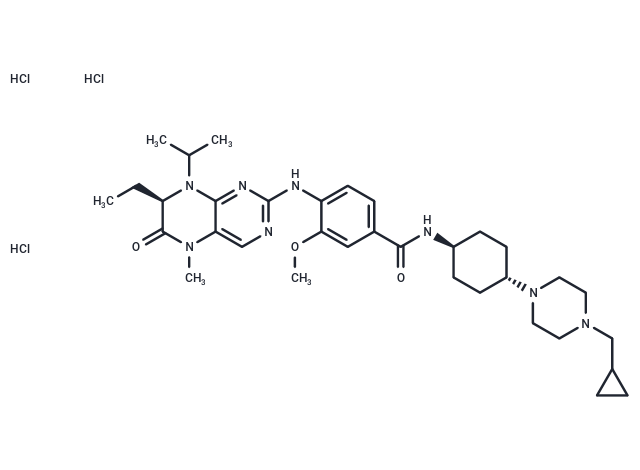Shopping Cart
- Remove All
 Your shopping cart is currently empty
Your shopping cart is currently empty

Volasertib (BI 6727) trihydrochloride is a dihydropteridinone derivative that potently and selectively inhibits Polo-like kinase 1 (PLK1), PLK2, and PLK3, acting as an orally active ATP-competitive inhibitor with an IC50 of 0.87 nM against PLK1, 5 nM against PLK2, and 56 nM against PLK3. Its mechanism includes inducing mitotic arrest and apoptosis, with significant antitumor activity observed in various cancer models.

| Pack Size | Price | Availability | Quantity |
|---|---|---|---|
| 5 mg | $970 | 1-2 weeks |
| Description | Volasertib (BI 6727) trihydrochloride is a dihydropteridinone derivative that potently and selectively inhibits Polo-like kinase 1 (PLK1), PLK2, and PLK3, acting as an orally active ATP-competitive inhibitor with an IC50 of 0.87 nM against PLK1, 5 nM against PLK2, and 56 nM against PLK3. Its mechanism includes inducing mitotic arrest and apoptosis, with significant antitumor activity observed in various cancer models. |
| In vitro | Volasertib trihydrochloride (BI 6727 trihydrochloride) demonstrates varied inhibitory effects across multiple cancer cell lines, with EC50 values ranging from 11 to 37 nmol/L after a 72-hour exposure. Specifically, it significantly inhibits cell proliferation in various cancers, including colon (HCT 116, EC50=23 nmol/L) and lung (NCI-H460, EC50=21 nmol/L) carcinomas, melanoma (BRO, EC50=11 nmol/L), and hematopoietic cancers (GRANTA-519, EC50=15 nmol/L; HL-60, EC50=32 nmol/L; THP-1, EC50=36 nmol/L; Raji, EC50=37 nmol/L). Within 24 to 72 hours at concentrations of 10-1000 nM, Volasertib induces a G2-M phase cell cycle block, evidenced by the accumulation of cells with 4N DNA content, and triggers apoptosis in NCI-H460 cells by 48 hours at a concentration of 100 nM. This compound's effectiveness across a broad concentration range (0.01-10000 nM) underscores its potential in cancer research and treatment, highlighting its role in inducing cell cycle arrest and promoting cell death in cancer cells. |
| In vivo | Volasertib trihydrochloride, administered at varying dosages and frequencies, demonstrates significant anti-tumor activity in human colon carcinoma and non-small cell lung carcinoma xenograft models. Specifically, oral administration of volasertib trihydrochloride at a total weekly dose of 50 mg/kg for 40 days showed comparable efficacy in human colon carcinoma xenografts. Intravenous doses of 15, 20, or 25 mg/kg/day for two consecutive days per week over the same period led to noteworthy tumor growth delay and even regression in these models. Additionally, in a non-small cell lung carcinoma xenograft model, 70 mg/kg given once weekly or 10 mg/kg daily orally significantly impeded tumor growth. A single intravenous dose of 40 mg/kg increased mitotic cells in tumor-bearing mice by 13-fold. The compound exhibits a high volume of distribution and prolonged terminal half-life in both mice (V ss =7.6 L/kg, t 1/2 =46 h) and rats (V ss =22 L/kg, t 1/2 =54 h). Pharmacokinetic analysis further confirmed its extensive distribution and long half-life following a 5-minute intravenous infusion at doses of 35 mg/kg for mice and 10 mg/kg for rats. |
| Alias | BI6727trihydrochloride |
| Molecular Weight | 728.2 |
| Formula | C34H53Cl3N8O3 |
| Cas No. | 946161-17-7 |
| Storage | Powder: -20°C for 3 years | In solvent: -80°C for 1 year | Shipping with blue ice. |

Copyright © 2015-2025 TargetMol Chemicals Inc. All Rights Reserved.